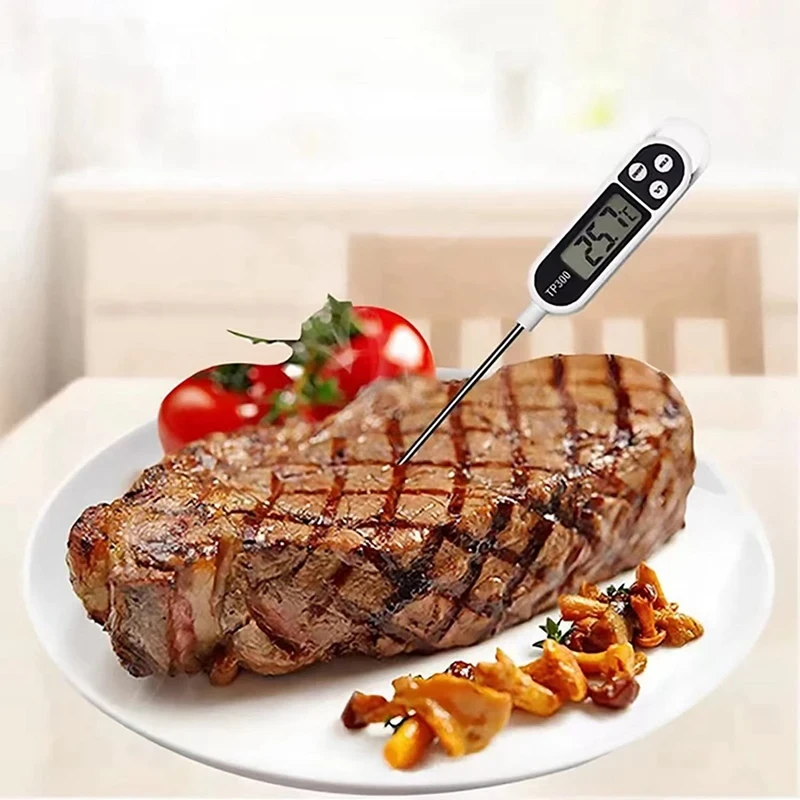Gwall fformat e-bost
emailCannotEmpty
emailDoesExist
pwdLetterLimtTip
inconsistentPwd
pwdLetterLimtTip
inconsistentPwd


Enhance Your BBQ Experience with a Grill Smoker Thermometer: The Ultimate Guide
Welcome to the ultimate guide on how to elevate your BBQ game with the help of a grill smoker thermometer. Whether you're a seasoned pitmaster or just starting out, having the right tools can make all the difference in achieving that perfect smoky flavor and tender, juicy meat. In this comprehensive blog post, we'll delve into everything you need to know about BBQ grill smoker thermometers, from how they work to why they're essential for mastering the art of BBQ.
Chapter 1: Understanding the Importance of Temperature Control
Why Temperature Matters in BBQ:
Temperature control is the secret ingredient behind every successful BBQ. Whether you're smoking brisket low and slow or searing steaks over high heat, achieving the perfect temperature is crucial for ensuring that your meat cooks evenly and retains its juiciness. Inconsistent temperatures can result in overcooked or undercooked meat, leading to disappointment among your guests.
The Role of Precision in BBQ Cooking:
BBQ is as much a science as it is an art, and precision is key to mastering it. A difference of just a few degrees can make all the difference in the texture and flavor of your meat. That's where a high-quality BBQ grill smoker thermometer comes into play. By providing accurate and reliable temperature readings, these thermometers allow you to maintain precise control over your cooking process, ensuring consistently delicious results every time.
Introducing the BBQ Grill Smoker Thermometer: Your Ultimate Temperature Control Tool:
The thermometer is your secret weapon for achieving BBQ perfection. Unlike traditional oven thermometers, which are designed for indoor use, these thermometers are specifically designed to withstand the high temperatures and harsh conditions of outdoor grilling and smoking. With features like durable construction, waterproof probes, and wireless connectivity, they make it easy to monitor your grill or smoker's temperature from anywhere in your backyard.
Chapter 2: How BBQ Grill Smoker Thermometers Work
Exploring Different Types of Thermometers: Analog vs. Digital:
The thermometers come in two main types: analog and digital. Analog thermometers use a mechanical mechanism to measure temperature and display the readings on a dial or gauge. While they're often less expensive than their digital counterparts, they can be less accurate and may require frequent calibration. Digital thermometers, on the other hand, use electronic sensors to provide precise temperature readings in real-time. They're typically more accurate and easier to read, making them a popular choice among BBQ enthusiasts.
Understanding Probe Placement for Accurate Readings:
Proper probe placement is essential for getting accurate temperature readings. When using a thermometer, it's important to insert the probes into the thickest part of the meat, away from any bones or fat. This ensures that you're measuring the internal temperature of the meat rather than the surrounding air or fat, which can lead to inaccurate readings. Additionally, be sure to position the probes away from direct heat sources to prevent damage.
Wireless vs. Wired Thermometers: Pros and Cons:
One of the key features to consider when choosing a thermometer is whether you prefer a wireless or wired model. Wireless thermometers allow you to monitor your grill or smoker's temperature remotely, via a receiver or smartphone app. This gives you the freedom to socialize with your guests or attend to other tasks while still keeping an eye on your cooking. However, they may be more expensive and susceptible to interference from other electronic devices. Wired thermometers, on the other hand, are typically more affordable and reliable but require you to stay within range of the base unit.
Calibration Tips for Ensuring Accuracy:
Even the most advanced thermometers can fall out of calibration over time, leading to inaccurate readings. To ensure that your thermometer is providing accurate temperature readings, it's important to calibrate it regularly. This involves comparing its readings to those of a known accurate thermometer and making any necessary adjustments. Most digital thermometers come with a calibration feature that makes this process quick and easy, but it's still a good idea to double-check periodically.
Chapter 3: Choosing the Right BBQ Grill Smoker Thermometer
Factors to Consider When Selecting a Thermometer:
When shopping for a thermometer, there are several factors to consider to ensure that you choose the right one for your needs. These include:
- Accuracy: Look for a thermometer with a high degree of accuracy, ideally within one or two degrees Fahrenheit.
- Durability: Choose a thermometer that's built to withstand the rigors of outdoor cooking, with features like waterproof probes and heat-resistant construction.
- Ease of Use: Opt for a thermometer that's intuitive to operate, with clear displays and user-friendly controls.
- Wireless Range: If you opt for a wireless thermometer, consider the range of the signal and whether it will cover the distance between your grill or smoker and your indoor living space.
- Price: Set a budget for your thermometer purchase and compare options within that price range to find the best value for your money.
Top Brands and Models to Consider:
There are many reputable brands and models on the market, each with its own unique features and benefits. Some top brands to consider include:
- ThermoPro: Known for their reliable and affordable thermometers, ThermoPro offers a range of models to suit every budget and cooking style.
- Weber: A trusted name in outdoor cooking, Weber offers a variety of thermometers designed specifically for use with their grills and smokers.
- MEATER: For the ultimate in convenience, MEATER offers wireless thermometers that connect to your smartphone via Bluetooth, allowing you to monitor your cook from anywhere.
Budget-Friendly Options for Beginners:
If you're just getting started with BBQ and don't want to invest a lot of money upfront, there are plenty of budget-friendly options available. Look for thermometers priced under $50 that offer basic features like digital displays, waterproof probes, and easy calibration. While these thermometers may not have all the bells and whistles of their more expensive counterparts, they can still provide accurate temperature readings and help you improve your BBQ skills.
Advanced Features to Look Out For:
For more experienced BBQ enthusiasts looking to take their cooking to the next level, there are several advanced features to consider when choosing a thermometer. These include:
- Multiple Probes: Thermometers with multiple probes allow you to monitor the temperature of multiple pieces of meat or different cooking zones simultaneously, giving you greater control over your cook.
- Wi-Fi Connectivity: Some thermometers offer Wi-Fi connectivity, allowing you to monitor your cook from anywhere with an internet connection, rather than being limited by the range of a Bluetooth signal.
- App Integration: Look for thermometers that integrate with smartphone apps, which can provide additional features like cooking guides, temperature alerts, and remote control of your grill or smoker.
- Cloud Logging: For data-driven cooks who want to track their cooks over time, some thermometers offer cloud logging features that allow you to store and analyze temperature data from your cooks, helping you identify patterns and improve your technique.
Chapter 4: Setting Up Your BBQ Grill Smoker Thermometer
Proper Installation Techniques:
Once you've chosen the right thermometer for your needs, it's time to set it up for your cook. Start by carefully reading the manufacturer's instructions and familiarizing yourself with the thermometer's features and controls. Next, install the probes according to the manufacturer's recommendations, making sure to insert them into the thickest part of the meat and away from any bones or fat. If you're using a wireless thermometer, ensure that the receiver is within range of the transmitter, and pair the devices as instructed.
Tips for Securing Probes and Cables:
To prevent your probes and cables from interfering with your cook or becoming damaged, it's important to secure them properly. Start by routing the cables away from any direct heat sources, using clips or hooks to keep them out of the way. For added protection, consider using heat-resistant cable sleeves or wraps to shield the cables from the intense heat of your grill or smoker. Finally, be sure to periodically check the probes and cables throughout your cook to ensure that they're still securely in place and functioning properly.
Avoiding Common Pitfalls During Setup:
While setting up your BBQ grill smoker thermometer may seem straightforward, there are a few common pitfalls to avoid to ensure a successful cook. These include:
- Overcrowding the Grill: Avoid placing too much food on your grill or smoker at once, as this can restrict airflow and lead to uneven cooking.
- Opening the Lid Too Often: Every time you open the lid of your grill or smoker, you release heat and smoke, extending the cooking time and increasing the risk of temperature fluctuations.
- Ignoring Temperature Alerts: If your thermometer alerts you to a temperature spike or drop, don't ignore it. Take immediate action to adjust your cooking temperature or airflow to prevent overcooking or undercooking your meat.
Chapter 5: Maximizing Efficiency and Flavor with Your Thermometer
Monitoring Temperature Fluctuations:
One of the biggest challenges in BBQ cooking is maintaining a consistent temperature throughout the entire cook. Temperature fluctuations can occur due to factors like wind, weather, and fuel consumption, leading to uneven cooking and unpredictable results. With a BBQ grill smoker thermometer, you can monitor your grill or smoker's temperature in real-time and make adjustments as needed to keep it within your target range. This ensures that your meat cooks evenly and retains its moisture and flavor.
Understanding Temperature Zones in Your Grill or Smoker:
Different types of meat require different cooking temperatures and techniques to achieve the best results. For example, low and slow cooking is ideal for tough cuts of meat like brisket and pork shoulder, while high-heat grilling is better suited to tender cuts like steak and chicken breasts. By understanding the temperature zones in your grill or smoker and how to use them effectively, you can customize your cooking method to suit the specific needs of each type of meat, resulting in perfectly cooked dishes every time.
Using Temperature Data to Adjust Cooking Techniques:
One of the biggest advantages is the ability to collect and analyze temperature data from your cooks. By tracking the temperature of your grill or smoker throughout the cook, as well as the internal temperature of your meat, you can identify patterns and trends that can help you improve your technique over time. For example, you may notice that your grill tends to run hotter on windy days or that certain cuts of meat cook more quickly than others. Armed with this knowledge, you can adjust your cooking techniques accordingly to achieve more consistent and predictable results.
Experimenting with Different Wood Chips and Charcoal Arrangements:
In addition to monitoring temperature, a thermometer can also help you experiment with different types of wood chips and charcoal arrangements to customize the flavor of your BBQ. For example, you might try using applewood chips for a sweet, fruity flavor or hickory chips for a bold, smoky flavor. Similarly, you can adjust the arrangement of your charcoal or wood chunks to create hot spots or cool zones in your grill or smoker, allowing you to cook different types of meat simultaneously or achieve the perfect sear on a steak.
Chapter 6: Troubleshooting and Maintenance
How to Troubleshoot Common Issues with Your Thermometer:
Despite their advanced features and reliable performance, BBQ grill smoker thermometers can sometimes encounter issues that affect their accuracy or functionality. Common issues to watch out for include:
- Dead Batteries: If your thermometer suddenly stops working, the first thing to check is the batteries. Replace them with fresh ones and see if that resolves the problem.
- Signal Interference: If you're using a wireless thermometer and experiencing signal dropouts or erratic readings, try moving the receiver closer to the transmitter or eliminating any sources of interference, such as other electronic devices or metal objects.
- Probe Damage: Over time, the probes of your thermometer can become damaged or worn, leading to inaccurate readings. Inspect your probes regularly for signs of damage, such as frayed wires or bent tips, and replace them as needed.
Cleaning and Maintenance Tips for Prolonging Lifespan:
To ensure that your BBQ grill smoker thermometer continues to perform at its best for years to come, it's important to clean and maintain it regularly. Start by wiping down the probes and cables with a damp cloth after each use to remove any food residue or grease. If necessary, use a mild detergent to clean stubborn stains, being careful to avoid getting water inside the probe housings. Additionally, be sure to store your thermometer in a cool, dry place when not in use, away from direct sunlight and extreme temperatures.
Storing Your Thermometer Properly During Off-Seasons:
During the off-season, when you're not using your grill or smoker as frequently, it's important to store your BBQ grill smoker thermometer properly to protect it from damage and ensure that it's ready to go when you need it. Start by removing the batteries from the thermometer to prevent corrosion. Next, clean the probes and cables as described above and coil them neatly for storage. Finally, store the thermometer in its original packaging or a protective case to shield it from dust, moisture, and other environmental hazards.
Chapter 7: Tips and Tricks from BBQ Experts
Insider Secrets to Perfectly Cooked BBQ:
To achieve truly exceptional BBQ, it takes more than just the right tools—it also requires skill, technique, and a healthy dose of patience. Here are some insider secrets from BBQ experts to help you take your cooking to the next level:
- Start with Quality Ingredients: The foundation of great BBQ is great ingredients, so always choose the highest quality meat, poultry, and seafood available to you.
- Master Your Fire: Learn how to build and maintain a consistent fire in your grill or smoker, adjusting the airflow and fuel as needed to achieve your desired temperature.
- Practice Patience: Good BBQ takes time, so resist the urge to rush the cooking process. Instead, embrace the slow and steady approach, allowing your meat to cook low and slow until it reaches perfection.
Creative Ways to Use Your Thermometer Beyond Meat:
While BBQ grill smoker thermometers are designed primarily for monitoring meat temperatures, they can also be used for a variety of other cooking tasks. Here are a few creative ways to use your thermometer beyond meat:
- Monitoring Baking Temperatures: Use your thermometer to monitor the internal temperature of bread, cakes, and other baked goods to ensure that they're cooked through and evenly browned.
- Testing Oil Temperatures: Use your thermometer to test the temperature of frying oil when making homemade French fries, fried chicken, or other deep-fried treats.
- Checking Beverage Temperatures: Use your thermometer to test the temperature of hot beverages like coffee, tea, or hot chocolate to ensure that they're not too hot or too cold.
Must-Have Accessories to Complement Your Thermometer Setup:
In addition to a high-quality BBQ grill smoker thermometer, there are several accessories that can help you get the most out of your cooking experience. Some must-have accessories to consider adding to your collection include:
- Grill Grates: Upgrade your grill with high-quality grill grates made from stainless steel or cast iron, which can help you achieve better sear marks and heat distribution.
- Meat Thermometers: In addition to your thermometer, consider investing in a few instant-read meat thermometers for spot-checking temperatures and ensuring that your meat is cooked to perfection.
- BBQ Tools: No BBQ setup is complete without a set of high-quality BBQ tools, including tongs, spatulas, and grill brushes, to help you handle and flip your food with ease.
Conclusion: Elevate Your BBQ Game with a Grill Smoker Thermometer
Congratulations! You've now mastered the art of using a BBQ grill smoker thermometer to achieve mouthwatering, restaurant-quality BBQ right in your backyard. By understanding the importance of temperature control, choosing the right thermometer, and implementing best practices for setup and maintenance, you're well on your way to becoming a BBQ aficionado. So fire up your grill, gather your friends and family, and get ready to impress with your newfound skills and knowledge. Happy grilling!

